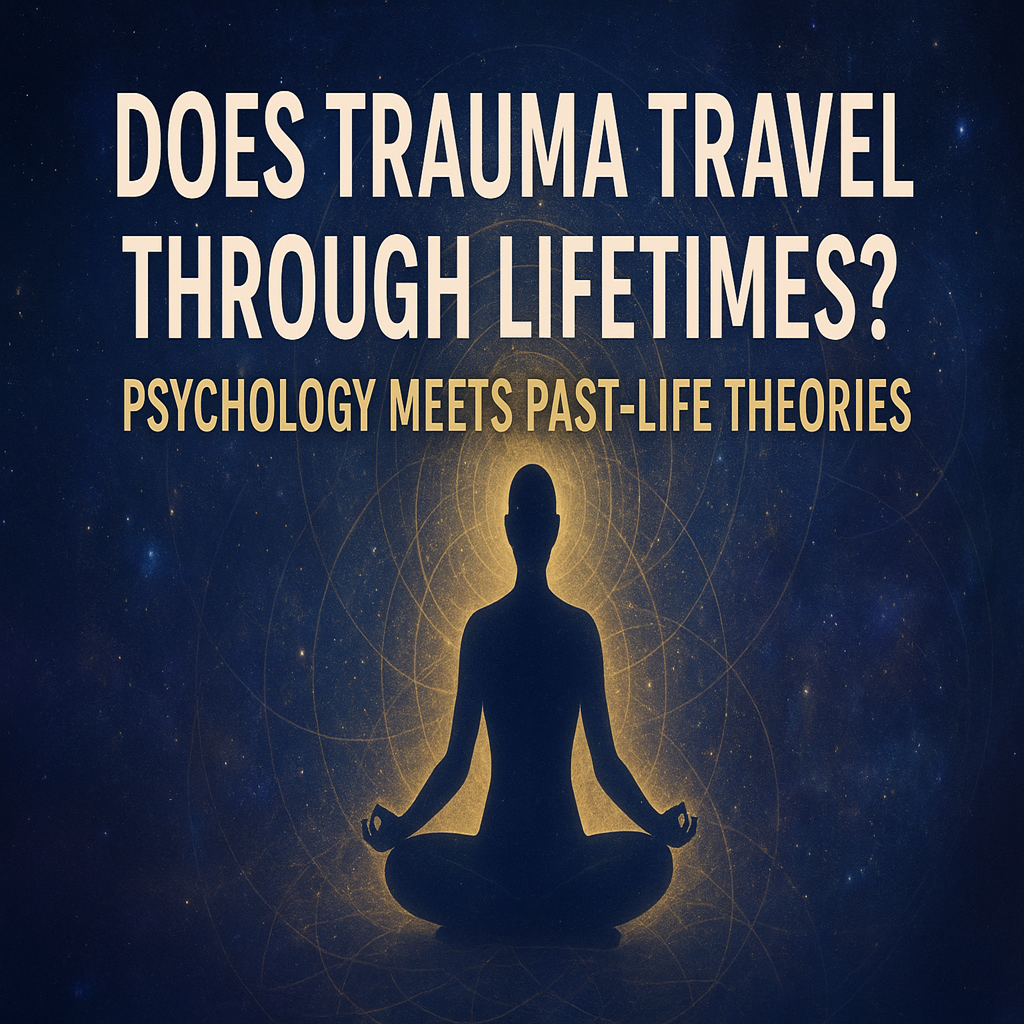
Does Trauma Travel Through Lifetimes?
The human mind is one of the most mysterious landscapes we know. It carries memories, emotions, and patterns that shape how we perceive the world. But what if some of these patterns are not only rooted in our present life experiences but are carried from past lives? This question sits at the fascinating intersection of psychology, mysticism, and metaphysics.
In modern psychology, trauma is understood as a deeply distressing or disturbing experience that leaves lasting emotional or physical scars. Meanwhile, in spiritual traditions and mystical sciences, there is a belief that unresolved trauma from previous lifetimes may linger, influencing our present circumstances. Together, these perspectives create a profound dialogue: Does trauma travel through lifetimes?
In this article, we will explore how psychology explains trauma, what past-life theories suggest, the role of memory and the subconscious, scientific studies that probe reincarnation, and whether healing methods like past-life regression, meditation, or energy work can free us from inherited emotional burdens.
Understanding Trauma from a Psychological Lens
In psychology, trauma is defined as a response to deeply distressing events such as abuse, accidents, war, or loss. Trauma imprints itself on the brain, specifically in regions like the amygdala, hippocampus, and prefrontal cortex, altering how we process emotions, fear, and memory.
Types of trauma:
- Acute trauma: from a single incident, such as a car accident.
- Chronic trauma: prolonged exposure to distress, such as domestic violence.
- Complex trauma: repetitive harm, especially in childhood, leaving deep emotional imprints.
Symptoms of trauma often reappear in cycles: flashbacks, phobias, recurring nightmares, relationship struggles, or unexplained fears. Psychology explains these as patterns rooted in unresolved emotional memory. But could these patterns extend beyond this life?
Learn more about Therapeutic Interventions and how can How to heal your past life trauma?
The Concept of Past-Life Trauma
In mystical and spiritual traditions, particularly in Hinduism, Buddhism, and esoteric philosophies, life is seen as a cycle of reincarnation. The soul travels from one lifetime to another, carrying unresolved karma and emotional imprints. This is sometimes called samskaras (mental impressions) in Vedic philosophy.
Past-life trauma refers to the belief that intense pain, fear, or suffering from previous incarnations can remain in the soul’s memory and manifest in the current life. For example:
- A person with an unexplained fear of water might have drowned in a past life.
- Someone who has chronic pain with no medical cause may be reliving an old wound from centuries ago.
- A person who feels an irrational fear of abandonment might have experienced betrayal or loss in another lifetime.
Psychology Meets Mysticism: The Bridge
Modern psychology typically does not recognize past-life trauma as a diagnostic category. However, certain areas of psychology overlap with these mystical theories:
- Epigenetics: Research shows that trauma can alter gene expression. Descendants of Holocaust survivors, for example, have higher stress hormone markers, even though they never directly experienced the trauma. This suggests trauma can be inherited biologically, much like mystical traditions suggest karmic memory is passed on.
- Implicit Memory: Psychology acknowledges that not all memories are conscious. Some are stored in the subconscious mind and influence behavior without awareness. Mystics argue that past-life memories might be buried in this same subconscious.
- Phobias and Unexplained Fears: Psychology attributes these to conditioning or early childhood experiences, but mystical sciences consider them potential echoes of past lives.
Scientific Investigations into Reincarnation and Past-Life Memory
Although mainstream science remains skeptical, some researchers have explored reincarnation with intriguing results:
- Dr. Ian Stevenson (University of Virginia): He studied over 2,500 cases of children who claimed to remember past lives. Many children gave accurate details about people, places, and events they had no way of knowing. In some cases, birthmarks matched wounds or scars of the deceased individuals they claimed to have been.
- Near-Death Experiences (NDEs): Many people report seeing visions of past lives or feeling connected to an eternal consciousness after clinical death. These accounts challenge the strictly material view of life.
- Past-Life Regression Therapy: Through hypnosis, some individuals recall vivid experiences from supposed past incarnations. While critics argue these may be products of imagination or suggestion, many report emotional healing after reliving and releasing those memories.
Trauma Across Lifetimes: How It May Manifest
If trauma does indeed travel through lifetimes, it might show up in several ways:
- Recurring Dreams: People often dream of places, wars, or experiences they have never lived but feel intensely real.
- Unexplainable Fears: Phobias like fear of fire, drowning, or enclosed spaces sometimes have no rational cause in this lifetime.
- Chronic Pain or Illness: Certain illnesses may appear psychosomatic, possibly linked to an unresolved emotional imprint from another life.
- Repetitive Relationship Patterns: People may attract the same kind of toxic partners, mirroring unfinished karmic lessons.
- Instant Connections or Aversion: Meeting someone for the first time yet feeling deeply drawn—or repelled—can hint at a karmic connection.
Healing Trauma: Psychology and Past-Life Approaches
Healing trauma requires a multidimensional approach. Both psychology and mystical sciences offer tools, and combining them may be especially powerful.
Psychological Methods:
- Cognitive Behavioral Therapy (CBT): Helps reframe thoughts and beliefs related to trauma.
- EMDR (Eye Movement Desensitization and Reprocessing): Effective for PTSD, helping reprocess traumatic memories.
- Somatic Experiencing: Focuses on releasing trauma stored in the body.
Mystical and Spiritual Methods:
- Past-Life Regression Therapy: Guided hypnosis to access and release past-life memories.
- Meditation & Mindfulness: Practices to quiet the mind and dissolve karmic imprints.
- Energy Healing (Reiki, Pranic Healing): Believed to cleanse emotional energy and heal karmic wounds.
- Rituals & Affirmations: Spiritual traditions often use mantras, prayers, and rituals to break karmic cycles.
When combined, these approaches allow healing on both the psychological and soul level.
Critics and Skeptics: The Rational Side
Skeptics argue that:
- Past-life memories could simply be cryptomnesia, where forgotten information resurfaces, creating the illusion of a past-life recall.
- Regression therapy may produce false memories due to suggestion.
- Reincarnation lacks scientific proof and falls outside empirical psychology.
Despite this, the therapeutic value of past-life exploration cannot be dismissed, as many individuals report profound healing and freedom from lifelong fears.
Why the Question Matters
The real importance of asking whether trauma travels through lifetimes is not just about proving reincarnation. It is about understanding the layers of human experience psychological, biological, and spiritual. Whether trauma is passed through DNA, subconscious memory, or soul journeys, the result is the same: people seek healing and freedom from pain.
Acknowledging the possibility of deeper roots to our suffering may inspire more compassion—for ourselves and others. Instead of dismissing irrational fears, perhaps we can approach them as clues to a larger story of the self.
Conclusion:
The debate over whether trauma travels through lifetimes bridges psychology and mysticism in profound ways. While psychology grounds us in the science of the brain, memory, and epigenetics, mystical sciences expand our perspective to the soul’s journey and karmic imprints.
Perhaps the truth lies somewhere in between. Trauma may be inherited biologically, embedded psychologically, and carried spiritually. Healing, then, requires us to embrace both science and spirit—to treat the brain, the body, and the soul.
As human beings, our deepest longing is to heal, evolve, and break free from cycles of pain. Whether trauma began in this life or lifetimes past, the path forward is the same: awareness, compassion, and transformation.

